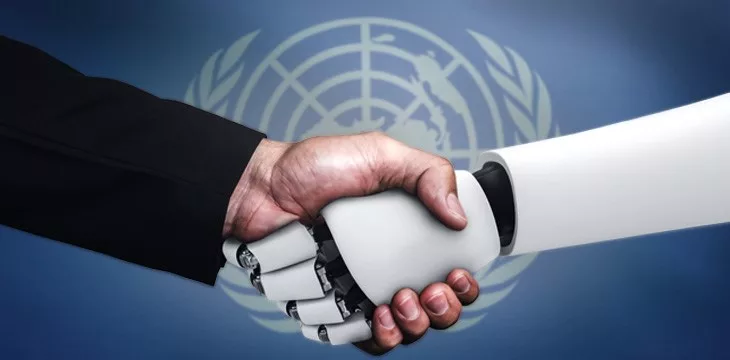|
Getting your Trinity Audio player ready...
|
The United Nations (UN) has created a new advisory body for artificial intelligence (AI), with the task of harnessing the technology for the common good while staving off bad actors.
AI wields enormous powers that could play a key role in achieving global sustainable goals, UN Secretary-General Antonio Guterres remarked during the official unveiling of the advisory body. However, if not properly managed, the technology may pose the same risks as nuclear warheads to international security.
“The transformative potential of AI for good is difficult even to grasp,” said Guterres. “It could supercharge climate action and efforts to achieve the 17 Sustainable Development Goals (SDGs) by 2030.”
The newly minted advisory body will spearhead the UN’s effort to integrate AI technologies to achieve its lofty ideals. Apart from use cases in the fight against climate change, the body will explore the use of AI by emerging economies to “leapfrog outdated technologies” in a rapidly changing world.
The advisory body, comprising experts in law, technology, and ethics drawn from 39 member states, is described by the UN as “gender-balanced, geographically diverse, and multigenerational.”
At the end of each year, the body will submit recommendations on the international governance of AI to mitigate risks and to identify opportunities to “leverage AI to accelerate SDGs.”
“This is the first step in that direction, and we hope to have more of this next year,” said Amandeep Singh Gill, the Secretary-General’s Envoy on Technology. “There’s an opportunity with the Global Digital Compact to embed this into more of a sustainable long-term perspective so that we are not caught napping by rapid-pace technology developments.”
For all its potential benefits, the UN is acutely aware of the dangers associated with the rogue use of AI. Guterres disclosed that bad actors could use AI to spread misinformation, invade users’ privacy, perpetuate fraud, and entrench bias and discrimination.
The UN Chief pointed to the concentration of AI technology in the hands of a few companies, laying the foundations for wider global inequalities.
A history of using innovative technologies
The UN has a long history of incorporating innovative technologies into its operations, with the World Food Programme (WFP) using blockchain technology to streamline its humanitarian services.
Houman Haddad, WFP’s Head of Innovative Technologies, disclosed in a CoinGeek interview that the agency has relied on Building Blocks, a blockchain allowing the WFP to authenticate every step of the aid process without violating the refugees’ privacy.
“By putting the people we serve at the very center, gaining a common visibility on who’s assisting whom, we can coordinate that assistance to ensure more equitable outcomes and make the redemption process simpler for the people dependent on that assistance,” said Haddad.
In order for artificial intelligence (AI) to work right within the law and thrive in the face of growing challenges, it needs to integrate an enterprise blockchain system that ensures data input quality and ownership—allowing it to keep data safe while also guaranteeing the immutability of data. Check out CoinGeek’s coverage on this emerging tech to learn more why Enterprise blockchain will be the backbone of AI.
Watch: AI & blockchain will be extremely important—here’s why

 03-01-2026
03-01-2026 




